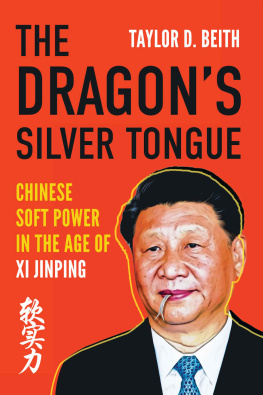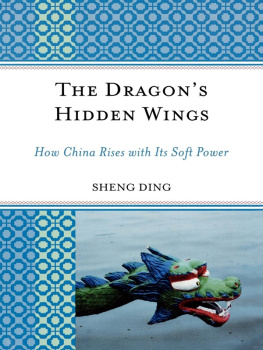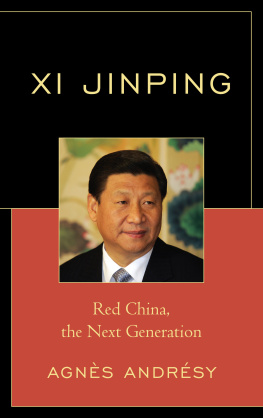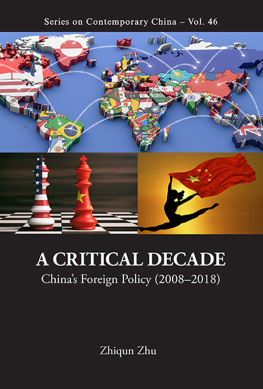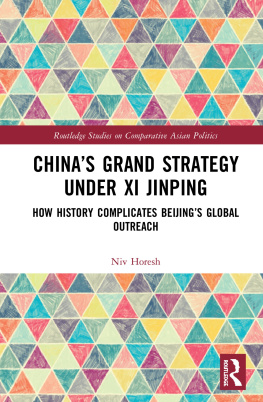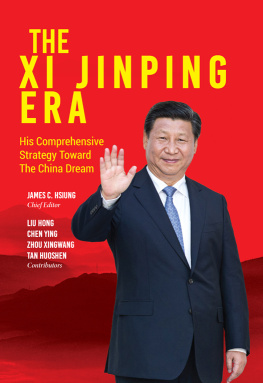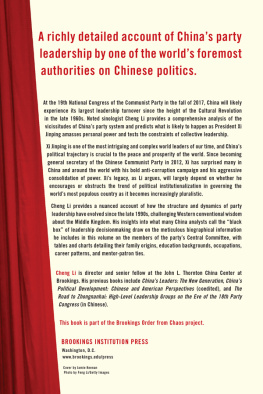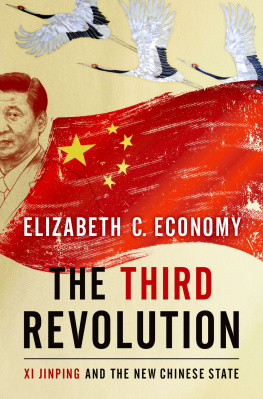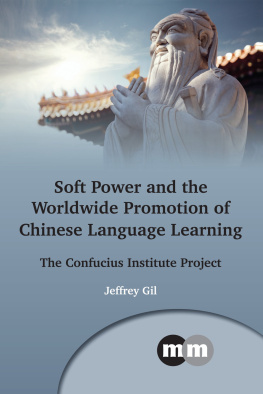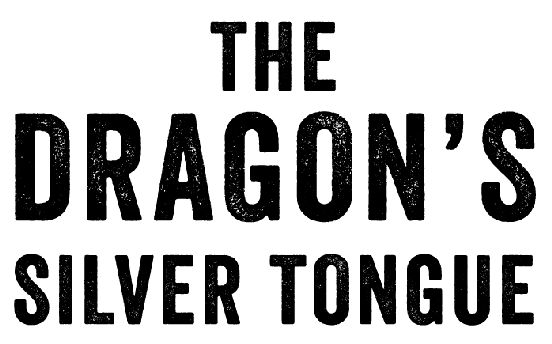
Chinese Soft
Power in the Age of Xi Jinping
Taylor D. Beith
Copyright 2022 Taylor D. Beith
All rights reserved. Without limiting the rights under copyright reserved above, no part of this publication may be reproduced, stored in, or introduced into a retrieval system, or transmitted, in any form, or by any means without the prior written permission of the author.
Contents
Preface
Chinas dramatic surge in power over the last 50 years has drawn no shortage of commentary. As its international footprint grew, Chinese leaders sought to assuage fears of those distressed by an emergent China through an extensive public relations effort with the concept of soft power, or the use of attraction and co-option instead of coercion, at its forefront. Chinas soft power cultivation aimed to downplay its human rights record, handling of sensitive subjects, and militant saber rattling, and as memories of Tiananmen and Tibet drifted into the back of the Wests recent memory, the strategy appeared successful. But since General Secretary of the Chinese Communist Party Xi Jinpings ascension to the position of paramount leader of the Peoples Republic of China in 2012, the Chinese soft power offensive must smooth over a much more complex and aggressive China. Assessments from around the world have poured in, addressing Xis international posture. His soft power efforts to include his signature One Belt One Road infrastructure project, increased humanitarian aid, and expanded United Nations contributions have been evaluated by detractors, proponents, and onlookers alike.
However, most ignore several crucial facets of Chinas soft power and view it on less than objective terms. Too often do writers approach the Peoples Republic as a villain to be overcome or a charity case held down by the international community. Such attitudes obscure the reality of Chinas precarious international position and can lead to misguided conclusions regardless of ones ultimate aims. In its infancy, Chinas soft power programs claimed that much of the apprehension about Chinas rise was simply a byproduct of ignorance about China itself. And perhaps they were right. No matter ones opinion or agenda on the matter, determining an accurate picture and comprehensive understanding of China is imperative to achieving any desired policy end state, even an adversarial one. Therefore, this book will look at Chinese soft power with a critical, but impartial eye and ask fundamental questions about it that have frequently gone overlooked: How does China define soft power? How does it apply and cultivate it? What does China seek to achieve through soft power? Why?
Many esteemed authors have tackled and answered these questions in depth, but as with all things, the Chinese soft power situation is neither immutable nor monolithic. Xi Jinpings presidency has fundamentally shaken many of the foundations upon which contemporary China was built. Not since Mao Zedong has the nation witnessed such a forceful personality at its helm. He has redefined the Party, the Chinese nation, and their approach to the outside world, challenging the ambivalence of his predecessors and charting a decisive new course for modern China in the international community. It should come as no surprise that, given these bold changes, soft power implications for Chinese diplomacy abound. At a time when Chinas influence on the world is ever expanding and public opinion on China is shifting, understanding Chinese soft power has never been more essential than it is today. It is therefore in the spirit of updating these questions for today that we explore how President Xis administration has affected the trend of Chinas soft power endeavors. The Dragons Silver Tongue aims to fill the knowledge gap in how Xis contradictory approach to soft power has performed in achieving its specific goals and how it fits into the larger conception of soft power. Though they represent but a few of the potential lines of inquiry that present themselves when delving into the soft power implications of Xi Jinping, this book will the following topics and how they relate to soft power - Chinas unique view of soft power itself, the Confucius Institute Project, Cross-Strait relations, Chinas relationship with the Global South, and the Chinese Western Interior. We will broach this with an introduction giving a brief history of Chinas foreign relations to provide some background and context.
Background: Beijing in Our Backyard
China is a sleeping giant. Let her lie and sleep, for when she awakens the world will tremble.
-Napoleon Bonaparte
Isolation
- The Middle Kingdom, or as its commonly known, China, has for centuries meant different things to different people. For the Ming, it meant an imperative to spread the glory and riches of China to the far ends of the globe. For the Yuan, the crown jewel of the Mongol Khanates plunder. But for most of recent Chinese history, the Middle Kingdom has referred to Chinas predilection for an almost navel-gazing inward focus that often manifested itself through foreign policy channels as isolationism. Much of this impetus can be tied to a distinct Chinese Imperial Chauvinism insisting on the nations unique place in history and the cosmos, notable for being prevalent not only among ethnic Han but adopted by many of Chinas conquerors as well. Such an attitude became policy during the Ming Dynasty. Beginning with the first Ming Emperor Hongwus declaration of the first haijin , or sea ban, in 1371, China closed its doors to the world for the first time. Allowing only tributary representatives to enter China and present their symbolic gifts of servitude that acknowledged China as the rightful ruler of the globe, the Ming banned most other forms of trade so as to crack down on smuggling, piracy, and foreign influence. This would not be the last time China implemented isolationist policies far from it. Instead, it served as a springboard for stricter prohibitions in the future. Subsequent Ming emperors and their Qing successors enacted similar policies restricting trade and foreign access to limited sanctioned locations and activities. The fall of the Qing Dynasty during the 1911 Xinhai Rebellion led only to the empty promises of peace and democracy that died with its champion Sun Yat-Sen shortly afterward. Instead, the rebellion only ushered in a Warring States period of the modern age, rife with nearly non-stop war until 1949, as Mao Zedongs Red Army declared the establishment of the Peoples Republic of China and the end of the Chinese Civil War. Chinas unification and modernization did not allow for internationalism, but rather the development of perhaps historys largest hermit kingdom.
Save for cautious dealings with the USSR and other sufficiently socialist nations, Maos China maintained the most drastic isolationist policies that the Middle Kingdom had ever seen. The now infamous stories of escapees swimming to the shores of Hong Kong serve as a clear indication of the lengths that Communist China went to preserve its barriers to the outside world. The depths of Chinese isolationism were precisely what made Nixons visit to China all the more revolutionary. Only Nixon could go to China rings true for Americans, but Nixons 1972 visit to China shocked the Chinese to the core. Although prevented from publically expressing such sentiments for fear of being perceived as criticizing the Great Helmsman, many Chinese were quite surprised by the proclamation that the President of the United States was to visit their cloistered China and meet with Chairman Mao on friendly terms. 12 years into the Cultural Revolution, most Chinese had been taught to hate Americans and Westerners, so the Nixon visit came as a sudden about-face for the doctrine that had come as second nature to the (outwardly) revolutionary masses. Public sentiment had a far more mixed reaction to the visit. The discrepancy between outward public display and individuals personal thoughts has had a storied, intricate place in Chinese culture, and Nixons visit to China was no different. It marked a sea-change in perception of the US amongst Chinese. Some of this was to simply fall in with the party line, to be sure, but for the first time, it seemed to many Chinese that the party line echoed public opinion on a major issue. Such feelings were only heightened upon Maos 1976 death.
Next page
